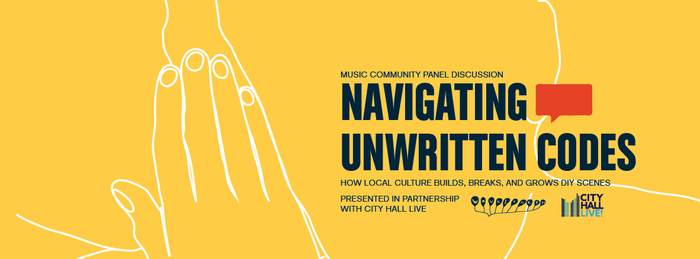UPDATE: Due to today’s winter storm, we are postponing tonight’s panel discussion. Stay tuned for the announcement of a new date for the event. But fear not, this weekend’s Wavelength Winter Festival will be going forward as planned!
The following blog tells the story of what inspired Wavelength’s new Guest Curator, Emma Bortolon-Vettor, to conceive of the topic for our upcoming music community panel discussion, Navigating Unwritten Codes. See you Tuesday Feb. 12, 2019 at the Toronto Media Arts Centre (32 Lisgar Ave.) from 7-9pm, for what promises to be a fascinating discussion. Free admission, and free coffee & cookies! Event info here.
I remember the first year I moved to Toronto. I was part of a new band with countless songs and was ready to break in to what I saw was a plethora of endless venues and scenes. It was 2009. You could still play house parties, dank basements, and spots like these: Soybomb, The Central, Ossington street, 8-Eleven, Smiling Buddha, the Silver Dollar Room – before they succumbed to urban shifts or assholianism. And so. Many. More.
I would go to these places, adore the energy, and have utterly no clue how to play here and how to connect with other musicians. I did, however, notice a type of social behaviour that led to artists leaving the back door onto a patio after playing, doing the simple act of having a smoke. And so, to start connecting with new bands and people, I too started puffing Belmonts. 10 years later, I managed to play some of these venues. I also manage to still smoke these damn things, even though many of the folks I encountered have since quit.
Yes, this is some surface level shit and it fits in with the indie rock scene that I entered. It worked for me, though. Did it work for you?
Did you ever put on a show and wondered how you could increase money made to pay the bands more effectively, especially if they’re touring? Selling beer might be the answer. Who didn’t get to go see your music as a result of alcohol being present? Maybe it’s youth, folks with addiction issues, or literally anyone who wants to drink something else other than tap water or beer.
DIY scenes are built on unwritten codes in how we construct and negotiate scenes, and for a ton of reasons: economics, demographics, and geography are a few of the heavy hitters. Others might be a lack of documentation or mentorship, or different expectations of what constitutes fairness. What is the situation like in Toronto and how does it differ from a smaller community? How have these sometimes secretive ways of DIY culture benefitted or limited growth of an arts culture and its subsets of expression?
This panel on February 12th is something very dear to me. Instead of just having a discussion where everyone spitballs ideas and thoughts, only to walk away from it all saying, “so what was the use of this?” I want this discussion to continue. I want these situations to be more than just a space where we throw talk around and see no walk.
How will this panel + workshop be different? Research.
I created a shareable Google folder with literature regarding scene creation, sustainability, and anything else that can be shared, read, and digested among this community. It would be awesome if you can also participate in sharing what you’ve read, or just reading from the folder. You can do so here: https://drive.google.com/open?id=1Hz1f8v_KzVwG8UAprl6LJ0j1__FW4v3hHgXtw1WPwkc.
After a panel discussion addressing some of these issues with further thought, we will break out into groups to perform a quick little workshop. Anyone can participate or choose not to participate. The ball is in your court. If you do want to participate, I am going to ask you to identify a code of conduct that you have experienced in your scene and propose a possible solution to it, if a code is problematic. We will gather all of these responses and format them into an accessible bank of primary data that anyone, including you, can access and use to your heart’s content. This input will extend beyond the discussion on February 12th, keeping responses open and on-going.
With this data, we can start to build a web of factors that affect our local scenes, how the city is involved, everything. Think of it as a surface map of things we do and why we do them.
Take this information and make something with it. Make art, question policy, do anything you can or want to do with this information.
It would be dope if you can attend on February 12th. If you can’t, then that’s cool too. We will be live-casting this meeting, and will have it available on the Wavelength website to watch later on.
Anywho, thanks for reading this and keep kicking ass,
Emma Bortolon-Vettor.

